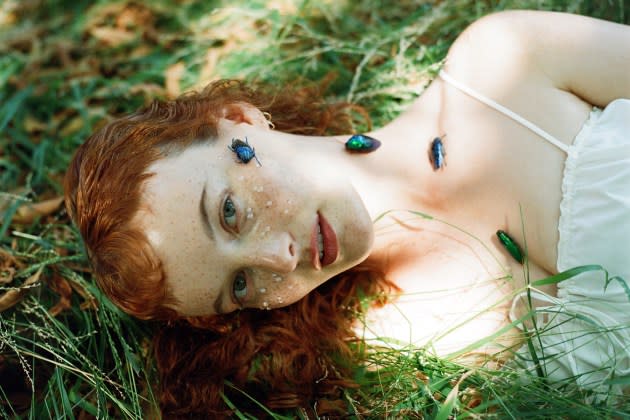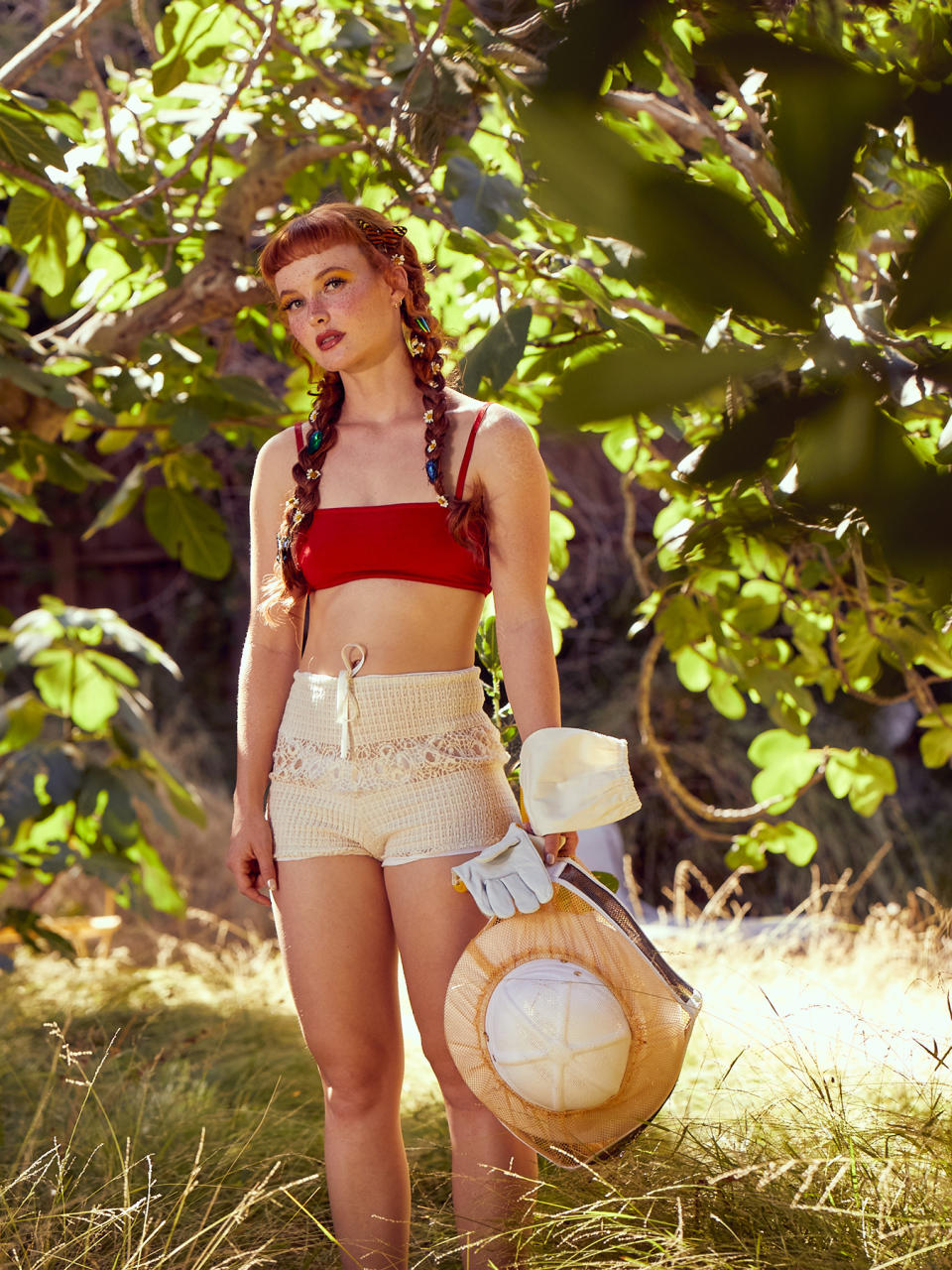Kacy Hill Almost Left Music to Become a Software Engineer
- Oops!Something went wrong.Please try again later.
- Oops!Something went wrong.Please try again later.

In the weeks leading up to her latest project Bug, Kacy Hill is dealing with the usual pre-album jitters. The Arizona-born singer is used to these. She’s been in the industry for over a decade now, having gotten her start as a back-up dancer on Ye’s Yeezus Tour and eventually being signed to GOOD Music. After releasing one album with the label — 2017’s Like a Woman — she announced her departure in 2019.
In the aftermath of parting ways, Hill pursued an independent music career during the pandemic, debuting Is It Selfish If We Talk About Me Again in 2020 before immediately beginning to record 2021’s Simple, Sweet, and Smiling. Now, after a few years figuring out whether or not music was still her passion, she’s back with the gorgeous, smooth new album Bug and a brand new outlook on creativity, thanks to friends and collaborators like Bartees Strange, Aidan Spiro, Nourished by Time, Donna Missal and more.
More from Rolling Stone
Bartees Strange Reimagines 'You Always Hurt the Ones You Love' for 'The New Look' Soundtrack
Kacy Hill's Album 'Bug' Takes Flight With Single 'You Know I Love You Still'
See St. Vincent, Jack Antonoff, Bartees Strange (and His Talented Mom) Sing in Holiday Cheer
Ahead of releasing Bug, Hill spoke about getting out of her last label contract, what she’s learned over the last decade as a musician, and how her album cover accidentally became controversial.
What has the last three years since Simple, Sweet, and Smiling looked like for you, creatively?Simple, Sweet, and Smiling was still deep in the pandemic, so the collaboration circle was a lot smaller. It was a really beautiful thing because it felt so insular. It forced me to learn a lot that I hadn’t before. That was the first record where I recorded my own vocals and did more production and was a lot more hands on than I had been before, which is the gift of being left to your own devices. This was an extension of that.
After that album, I felt pretty burned out. A lot of artists that I know who also put out music during the pandemic felt like the return was not there since touring was pretty limited. And the touring that was there felt weird because we were not out of the woods. This feels like the first time I’m seeing momentum again, where I’m around people.
Did you take time off?
There was a time off period where I genuinely didn’t know if this was what I wanted to do. Getting out of my GOOD Music contract feels like that took years off my life. It was very stressful. It was about so many things that were not about making music. That was a traumatic experience. And then to put out two albums as an independent artist, I was just like ‘What is the return on that?’ Not everything needs to make you rich…it wasn’t even about that. I just felt really fried. So it did take a little bit of time to figure out what I wanted to do.
I thought about being a software engineer. I took a couple coding classes online and realized maybe not [laughs]. In that time, I started making music again with friends and reaching out to people for collaboration. That’s what gave the joy back to me. I found a lot of what I was longing during the pandemic.
After how difficult it was to get out of your GOOD Music contract, what made you ready to sign with Nettwerk as your new label home?
I had met with a handful of labels. The gift of signing with someone new on my fourth album versus my first is that I basically had a finished album [when I did it]. I felt comfortable going into a new relationship with a label knowing that they knew exactly what they were getting.
I think this is a problem with a lot of artists who are very young and a label or someone gets excited about one song that they’ve made. It can be a difficult relationship between the artist and the label because neither party really knows exactly what they’re getting into, so there are like expectations that then can fall short, and it can create tension. Nettwerk seems to operate a little bit differently and they got what I was doing. I didn’t feel like I had to explain it too much. Honestly, at this point in my career, I still had no interest in talking to a major label, and I’m sure they had no interest in talking to me.
After having had that experience of getting signed young and then deciding to leave that contract, what have you learned the most over the last decade of your career?
A decade ago, I had no idea who I was. The people that I was surrounded by both on the management side and label were a lot of ultra-successful people. I felt like an outsider. I felt like I had to get rid of the parts that I felt kind of ashamed of. That’s something I’ve had to unpack as I get older. And I think that that’s an LA thing, too. There’s so many people that grew up around entertainment and with money, and I felt unworthy. I felt like they had the wrong person.
What I’ve learned is that who I am as an artist is all of the things that I was trying to get rid of when I was young. People are interested in what I do and the perspective that I have. I’ve now just been spending a lot of years embracing that.

What was inspiring your new music for Bug?
The last three albums have had a lot of the same musical inspirations, like Peter Gabriel, Sting, Christopher Cross, Bruce Hornsby. I was revisiting a lot of Sheryl Crow. I had been so deep in the hip-hop and rap world — which was amazing and I’m so grateful for it — but I’m also a white girl from Arizona. I listened to Sheryl Crow and lots of Nineties alternative. I was also returning to a lot of country music, like the Chicks and Faith Hill and Tim McGraw. For me that is always the gold standard of songwriting. The ultimate goal is to write a classic song.
Where did the album title come from?
“Bug” has always been my name. Growing up, I was “Bug” and my mom’s still calls me “Bug.” I think that my quest for my own artistry has been a practice in coming back to myself, and finding ways to expand upon that and upon the things that I’m interested in. My favorite artists and my favorite music is always an extension of them and of their lives. Great songwriting is finding a way to distill that into something that feels universal.
It was also an ode to gardening, which was one of the things that really helped me in my burnout as well as in finding what it is that I loved and cared about in life. Getting back to nature and sticking my hands in dirt and seeing worms and watching the little miracles of life puts everything into perspective.
What’s in your garden?
I had vegetables, but I went through a huge break-up in January, which is also a lot of the record. I lost my garden in the divorce basically. But I had lots of vegetables: broccoli and beets and carrots and tomatoes and dill and snap peas and lettuces. It’s beautiful watching something grow from a little seed. I would go out and visit it every morning.
You had some trouble with Instagram taking down your album cover. What was going on?
When Chuck [Grant, the photographer] and I were shooting it, I really didn’t think it was particularly racy. It did not occur to me that it would be an issue to post. It’s just a side butt… I see butts every single time I open up Instagram. Instagram is home to so many butts. After I posted it, it got taken down over and over again. I don’t know if it was someone reporting it or whatever. It’s interesting that some of the comments have been like “I don’t know why women still feel the need to show their bodies and in today’s day and age,” like the music industry expects it. I just didn’t think it was that deep. I just really liked the picture. Also, literally everyone has a butt. I didn’t think it was particularly sexual. Damned if you do, damned if you don’t.
Best of Rolling Stone

